
By Joe Nick Patoski, American-Statesman Staff
Austin American-Statesman, October 22, 1978
|
But considering the neatly dressed, articulate man doing the talking, this wasn't casual armchair speculation, but a seasoned overview of the phenomenom from someone who has been in the thick of it. Sterling Morrison has spent the last five years or so at the University of Texas, first as a student, then as a teaching assistant in the English department, and more recently as a doctoral candidate. But before he sought a higher education in Austin, Morrison lived an entirely different lifestyle as guitarist and sometimes vocalist with the Velvet Underground, a band rightfully credited as the primary inspiration of the New Wave and punk rock movement that appears to have taken root not only in New York and Los Angeles, but in the heartland of America as well. And though Morrison has, until recently, maintained a low profile in Austin, preferring to keep his past in the shadows, his contributions are beginning to come to light locally. When bands such as the Ramones, Patti Smith, and Talking Heads hit town this year, sooner or later someone will pop the question: Where's Sterling? So when Morrison knocked the rock over a few mugs of beer one recent afternoon, a couple of listeners hung in closely to get the message. The time has once again arrived to revitalize the music. "Musical technicians and poets have taken over," Morrison declared with a slight accent that betrayed his New York upbringing. "You can't write a lyric anymore unless you're a heavy poet and you have all this philosophical baggage. Rock'n'roll has to instruct for these people. It has to tell you things. "Now you go back to when the music started. They told you what you already know and they said in language that is exactly the same as your language. With the early poets -- the best of the whole pack is Chuck Berry -- there's not a single pretentious line anywhere in their stuff." As far as he's concerned, the only hope is in the punks. "It had to break down eventually. Nothing is more boring to me than Roy Buchanan. That kind of detached efficiency is rotten and destroying the music. In the beginning the whole idea was anybody could play if they felt like it. Delinquents like rock'n'roll and if you like rock'n'roll you're a delinquent. Some delinquents have to be the band, some have to be the audience. That's the way it went. "In that sense, that's what I like about the punks. Some of them are going to be the audience and some of them are going to be the band. There seems to be not much distinction between the two." The culprit for implied competence, Morrison said, was the most popular band in the '60s. "It seems to me the Beatles attracted a whole new audience to rock. All of a sudden the sociologists, the musicologists, and very serious responsible members of the community started listening to this new music from England. "These are the same people who two weeks before had kicked 'Louie, Louie' off the air. It's a shame," Morrison lamented, sharing a common sentiment John Belushi. "'Louie, Louie' was one of the last pure American, untainted rock'n'roll songs. Right before the Beatles was this quintessential American rock record of unintelligible lyrics, which were hopelessly obscene, if you could ever find out what it was. From that we went to the Beatles and 'I Wanna Hold Your Hand' in one fell swoop. "All of a sudden it became intellectually responsible to listen to rock for content." About the same time the Beatles were injecting deep meaning into the nature of rock with "Sgt. Pepper's Lonely Hearts Club Band," setting the stage for the full flowering of the love generation, Morrison's band began digging beneath the soft, white underbelly of rock, exposing rock's darker side in self-descriptive songs like "Heroin," "Sister Ray," and "I'm Waiting On The Man." It was an unlikely destination for a good suburban boy from Long Island who enrolled at Syracuse University in 1963 with another kid from a neighboring town named Lou Reed. Both were English and creative writing students who shared the same ennui-laden, middle class environment.
The band evolved into a favorite of the New York art crowd (Andy Warhol designed the cover of their second album - a removable paper banana peel that revealed a banana underneath) and eventually became the East Coast answer to West Coast psychedelia by hosting multimedia experiences know as "Happenings" (which spawned the concept of light shows at rock concerts). Though national attention was focused of San Fransisco, the Velvets offered music with similar trappings, albeit with more sinister undertones. In retrospect, Morrison said that his band, though less recognized, carried more impact. "We had drugs in common with the West Coast bands," he explained. "But they were different drugs. And like whose vision of the world is correct? We were right. The love, peace, and flower power people were wrong. They were dead wrong." But the Velvets paid a penalty for commenting on the more disgusting aspects of living in the '60s. Commercial recognition was non-existent. Their records were almost universally banned on the radio ("It would have taken a total lobotomy to get us on the AM charts," Morrison claimed). Over one three-year stretch, they couldn't book a gig in their hometown. "I know that the New York D.A. didn't believe we were a band at all. He thought we were a narcotics ring, using the music as an excuse to travel," Morrison said. Such notoriety was difficult to accept at the time, though eventually the Velvets were hailed for ushering in the New Wave era 10 years before the fact, which most of the present bands acknowledge. "We were honest. All the problems the bands of today have, we had in spades, and we never knuckled under. "My favorite line -- it was one of the things that ruined my life -- was from Marlon Brando in the movie 'The Wild One' where he's running around with this girl from the luncheonette and his old biker chick comes up to him and starts shaking him saying, 'Johnny, Johnny, what are you rebelling against?' "He says, 'Whadaya got?' "I was sitting in the audience and I said, 'My, my, that is the answer right there.'" But at the turn of the decade Brando's revelation had disintegrated into petty record business politics. Among other problems, Lou Reed demanded full songwriting credits from the rest of the band for the Velvets best-selling "Loaded" under the threat of lawsuit, according to Morrison. John Cale had already left the band. Two bogus live albums found their way to the record racks. In 1971, Morrison walked away. "It was disillusionment with music in general," he explained. "I saw Velvet Underground music as a crusade and it was a real personal thing for me. We were not going to compomise and in the sense that we never did, we succeeded. We actually did have an audience though we never did have airplay. The second hurdle was we had to have a commercial success and there's no way to do that without changing. "Lou and I were arguing seriously about where we were going to go. The thing that I didn't like about myself, what I did, was I sat back and allowed myself to watch John Cale leave the band. Essentially the problems came when John left." Morrison found refuge in the academic life in Austin, where the music scene he'd known didn't exist. "It was the perfect musical backwater. That was the main reason I came. It wasn't the East Coast or the West Coast and since I was going to cold turkey music for a while this was the place to do it. I didn't know a soul. Progressive country I'd never heard of. If I wanted to stay home at night and read books I really wouldn't be bothered. It worked. I could not have stayed in school if I was on the East or West coasts. Something would have brought me out of the house." His hermitic existence has been on the wane. Over the last three years Morrison has become a visible nightcrawler at local clubs and even picked up his guitar again, frequently performing with the Bizarros, an occasional Austin rock band. "Things are all right again," he said. "Rock music is making some kind of inroads around here. For me the first sign that something was happening was when Roxy Music hit here a few years back. They were absolutely the first people that I knew from before that had ever come to Austin. My old world was encroaching on me again." Reed and Morrison made their peace last spring when Lou played the Austin Opry house. "We had a good laugh," Morrison said. Some day he might even return to making music as a part-time avocation, but only after finishing his Ph.D. dissertation on old English poetry. In the meantime, he can rest on his laurels and watch another generation of anarchistic youngsters mold a new shape for rock and roll. |
Created by Olivier Landemaine |
 "Rock is going to be rescued from competence. Somehow the fun has come back into it. That's what's missing from it all."
"Rock is going to be rescued from competence. Somehow the fun has come back into it. That's what's missing from it all." Reed eventually graduated but Morrison lasted less than a year. Still, the friendship was strong enough to pick up several years later in New York City where the two combined their musical interests in the Velvet Underground, adding the classically inclined cellist John Cale and drummer Maureen Tucker in the process.
Reed eventually graduated but Morrison lasted less than a year. Still, the friendship was strong enough to pick up several years later in New York City where the two combined their musical interests in the Velvet Underground, adding the classically inclined cellist John Cale and drummer Maureen Tucker in the process.